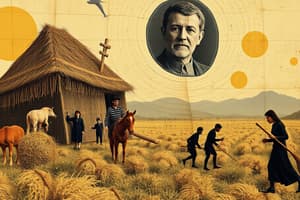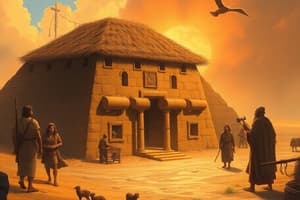Podcast
Questions and Answers
Where did the first humans, the homosapians, originate from?
Where did the first humans, the homosapians, originate from?
- East Africa (correct)
- Northern Africa
- West Africa
- Central Africa
What major societal change occurred during the Neolithic Agricultural Revolution?
What major societal change occurred during the Neolithic Agricultural Revolution?
- End of animal domestication
- Shift from hunting to farming (correct)
- Decline in human population
- Transition from sedentary to nomadic lifestyle
Which term refers to the time period characterized by the use of stone tools before agriculture?
Which term refers to the time period characterized by the use of stone tools before agriculture?
- Neolithic
- Paleolithic (correct)
- Industrial
- Egalitarian
What is the primary reason for the migration patterns identified in the Africa Theory?
What is the primary reason for the migration patterns identified in the Africa Theory?
What social structure developed as a result of the Neolithic Agricultural Revolution?
What social structure developed as a result of the Neolithic Agricultural Revolution?
What term describes skilled workers who specialized in specific trades after the Neolithic Agricultural Revolution?
What term describes skilled workers who specialized in specific trades after the Neolithic Agricultural Revolution?
How did the roles of women change during the transition from egalitarian to patriarchal societies?
How did the roles of women change during the transition from egalitarian to patriarchal societies?
What was a significant consequence of increased food production during the Neolithic period?
What was a significant consequence of increased food production during the Neolithic period?
Flashcards
African Migration Pattern
African Migration Pattern
Early humans migrated from East Africa, following water sources, across the Nile River and into other regions like Saudi Arabia, North to Russia and North America, and later to South America.
Neolithic Agricultural Revolution
Neolithic Agricultural Revolution
A shift from hunting and gathering to farming, approximately 10,000-8,000 years ago. This change was mainly spearheaded by women from Iraq.
Egalitarian Society
Egalitarian Society
A society where men and women hold equal status (roles still exist but not dominant).
Shift to Patriarchal Society
Shift to Patriarchal Society
Signup and view all the flashcards
Domesticating Animals
Domesticating Animals
Signup and view all the flashcards
Impact of Increased Food Production
Impact of Increased Food Production
Signup and view all the flashcards
Artisan
Artisan
Signup and view all the flashcards
Division of Labor
Division of Labor
Signup and view all the flashcards
Study Notes
Africa Theory
- Early humans migrated from East Africa to other regions, including North America.
- Initially, civilizations were formed near water sources for food and water.
Early Homosapians
- Humans existed in various time periods defined by Stone Ages (Paleolithic and Neolithic).
- Early humans exhibited egalitarian societal structures.
Neolithic Agricultural Revolution
- A shift from hunting and gathering to agriculture occurred approximately 10,000 to 8,000 years ago.
- This shift resulted in more food, which drove an increase in population.
- Initially, there was an egalitarian society, with men and women having roles in the society.
Women's Role and Impact of the Neolithic Agricultural Revolution (NAR)
- Initially, roles between men and women were similar and equal (egalitarian).
- As food production increased, a clear division in labor and responsibilities developed among different groups.
- There is evidenced diminishment of roles for women in the society.
- Women likely played a supportive role, with men taking on the majority of labor activities while domesticating animals.
Artisans
- Development of skilled labor (artisans).
- Specialized crafts emerged—creating bricks, fences, etc.
- Increased population and division of labor led to specialized roles, including teachers, priests, etc.
Mesopotamia
- City-states were governed independently.
- Examples include regions like Egypt, Mesopotamia, and others that emerged as independent city-states.
- Religious temples reflected a belief in higher powers.
- Most were polytheistic in nature.
- Social classes emerged, leading away from egalitarian society to a more patriarchal one in society.
- Advancements included ziggurats, irrigation systems, written language (cuneiform), astronomy, metallurgy (creating alloys), and the wheel.
Studying That Suits You
Use AI to generate personalized quizzes and flashcards to suit your learning preferences.




